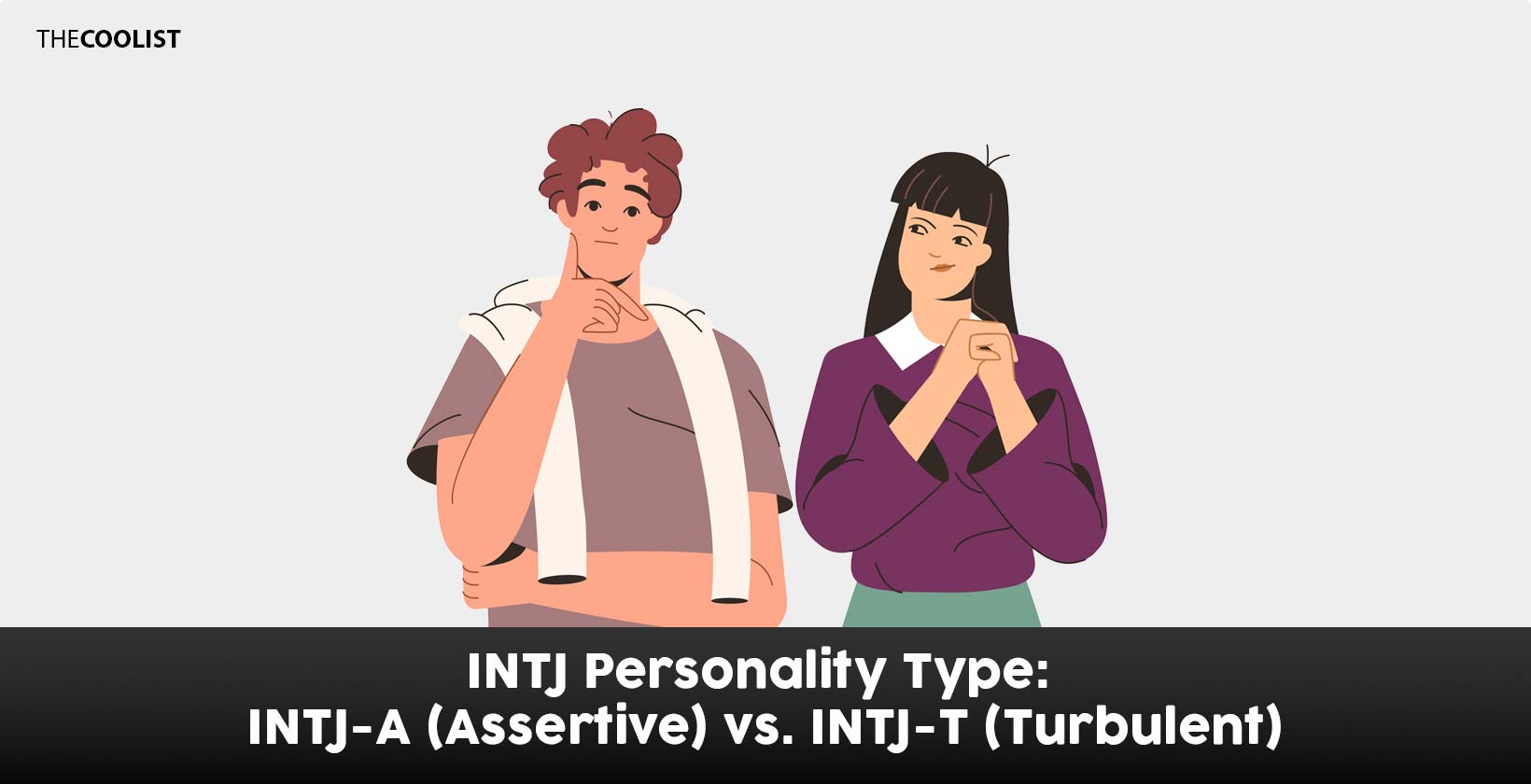View in gallery
The INTJ personality type is divided into two distinct subtypes: INTJ-A (Assertive) and INTJ-T (Turbulent). Both subtypes share Introversion, iNtuition, Thinking, and Judging personality traits, and thus are imaginative thinkers who focus their energy internally and prefer organization over impulsivity. Both Assertive and Turbulent subtypes fall under “The Mastermind” archetype, and are both creative and analytical. Statistics show that INTJ is a fairly uncommon personality type, which points to the uniqueness of The Mastermind’s specific combination of personality traits.
However, there are some important differences between INTJ-A versus INTJ-T. Assertive INTJs are highly independent, somewhat socially insensitive, and speak their minds with confidence. Turbulent INTJs, on the other hand, are more diplomatic and willing listen to others’ opinions, but lack confidence relative to the Assertive INTJ. Below, we fully compare and contrast the traits and characteristics of the two INTJ personality subtypes.
What is INTJ-A (Assertive)?
Assertive INTJs are decisive and strong-willed. INTJs are self-assured logical thinkers and identify as INTJ-As because of their naturally Assertive traits. INTJ-As display an even higher level of assertiveness that others perceive as brash or arrogant.
What is INTJ-T (Turbulent)?
Turbulent INTJs are indecisive and timid. INTJs are introverts and need to be on their own to recharge their energy levels. However, INTJ-Ts are more conscious of and overwhelmed by their imperfections and emotional turmoil.
What are the characteristics of INTJ-A (Assertive)?
There are three main characteristics of INTJ-As. Firstly, INTJ-As are independent. Assertive INTJs are self-reliant and thrive on autonomy. Secondly, INTJ-As are insensitive. INTJ-As are sure of themselves and will boldly assert their ideas and opinions. Thirdly, Assertive INTJs are inflexible. INTJ-As don’t like change and will find it difficult to accept other peoples’ ideas. Assertive INTJsindependence and insensitivity towards others’ opinions create an inflexible attitude toward change.
What are the characteristics of INTJ-T (Turbulent)?
There are three main characteristics of INTJ-Ts. Firstly, INTJ-Ts are self-conscious. INTJ-Ts value perfection and are more likely to doubt themselves because they strive for perfection. Secondly, Turbulent INTJs are tactful. INTJ-Ts are sensitive to others’ emotions and will respectfully assert themselves. Thirdly, INTJ-Ts are adaptable. Turbulent INTJs are open to communication and adapting to other peoples’ ideas. INTJ-Ts ’quest for self-consciousness aligns with their tactfulness to allow for adaptability regarding others’ opinions.
What are the career paths for an INTJ-A?
There are four ideal career paths for the Assertive INTJ personality (INTJ-A).
- Attorney: INTJ-As enjoy careers that utilize their logical reasoning skills and require them to solve unique problems. INTJ-As also boast the confidence necessary for an attorney to argue their case.
- Economists: INTJ-As thrive in careers that draw from observational skills and require analytical thinking. INTJ-As also possess the direct communication skills necessary for economists to relay crucial information to other employees.
- Editor: INTJ-As excel in careers that require careful planning and attention to detail. INTJ-As also thrive in career fields that keep them busy and are full of exciting new challenges, and editing has no shortage of work.
- Biochemist: INTJ-As enjoy careers that require complex problem solving and allow for them to expand on their ideas. INTJ-As are also detail-oriented, which is necessary for Biochemists to conduct proper research.
What are the career paths for an INTJ-T?
There are four ideal career paths for the Turbulent INTJ personality (INTJ-T).
- Civil Engineer: INTJ-Ts do well in career fields that allow them to use logic and maintain the scope of their clients’ needs. INTJ-Ts also have the flexibility to adapt to the situational changes civil engineers face.
- Auditor: INTJ-Ts are tactful and perfectionists, ensuring their ability to oversee clientele and their clients’ documents. INTJ-Ts are also observant, which aids auditors in their research.
- Columnist: INTJ-Ts are flexible but still appreciate schedules and thrive with enough space to express their opinions. INTJ-Ts are also creative, which helps columnists when writing.
- College Administrator: INTJ-Ts can adapt to multiple roles, such as financial advisement or assisting students with their schedules. INTJ-Ts are also introverts, and college administrators spend much of their time working alone or in small one-on-one sessions.
How do INTJ-A (Assertive) and INTJ-T (Turbulent) behave in a relationship?
INTJ-A and INTJ-T behave seriously in relationships and are methodical in their actions. Each INTJ subtype is logical and supportive in their relationships. INTJ-As and INTJ-Ts behave differently in relationships in how they process their partner’s emotions. Turbulent INTJs are timid and sensitive to their partner’s needs. While Assertive INTJs are more inflexible regarding their ideas and desires. Learn more about INTJ relationships and compatibility.
How do INTJ-A (Assertive) and INTJ-T (Turbulent) behave in parenting?
INTJ-A and INTJ-T behave strategically in parenting, extensively planning and preparing every element. Each INTJ subtype values having a plan and accomplishing goals. INTJ-As and INTJ-Ts behave differently in parenting in how they communicate with their child. Turbulent INTJ parents are timid and will approach conversations with caution. However, Assertive INTJs are direct with their children, and their frankness brings forth new ideas and experiences.
What are the statistics of INTJ-A (Assertive) and INTJ-T (Turbulent)?
There are limited modern statistics for the prevalence of INTJ-A and INTJ-T subtypes. INTJs account for just 4.8% of the population. Although the specific prevalence of INTJ-As and INTJ-Ts is unknown, it is possible to roughly estimate their prevalence within society by looking at their traits as below.
Introverted and Thinking combined account for 23.2% of the testing pool. INTJ-As are staunch introverts that excel in logical reasoning. However, INTJ-Ts are more in touch with iNtuition and Judging, which account for 19.8% of the testing pool. Because assertive qualities are more common in INTJ personality types, more INTJs are likely to identify with INTJ-A than INTJ-T.
What are the differences between INTJ-A (Assertive) and INTJ-T (Turbulent)?
There are three differences between INTJ-As and INTJ-Ts. Firstly, INTJ-As and INTJ-Ts have different levels of self-esteem. INTJ-As are self-assured and unlikely to doubt their capabilities. INTJ-Ts are prone to insecurities and will question their abilities. Secondly, INTJ-As and INTJ-Ts have different approaches to communication. INTJ-As are straightforward, and others perceive them as arrogant. INTJ-Ts are timid, and others perceive them as approachable. Thirdly, INTJ-As and INTJ-Ts have different responses to stressful stimuli. INTJ-As are self-assured and experience less anxiety and uncertainty than their Turbulent counterparts. INTJ-Ts are more concerned with other peoples’ emotions and endure stress trying to be perfect.
What are the similarities between INTJ-A (Assertive) and INTJ-T (Turbulent)?
There are three similarities between INTJ-A and INTJ-T. Firstly, INTJ-As and INTJ-Ts are introverts. INTJ-As and INTJ-Ts internalize their problem-solving, work well alone, and require isolation to recharge their energy levels. Secondly, INTJ-As and INTJ-Ts are strategic thinkers. Both subtypes use their logical reasoning skills to accomplish their goals and problem solve. Thirdly, INTJ-As and INTJ-Ts are ambitious. Both assertive and turbulent subtypes have the drive to reach their goals and master new skills.
Is INTJ-T (Turbulent) prone to stress?
Yes, INTJ-Ts are prone to stress. Turbulent personalities find it difficult to regulate emotions, which adds to INTJ-Ts’ susceptibility to stress. INTJ-Ts struggle with perfectionism and hyper-fixate on the opinions of others, resulting in low self-esteem that causes stress. INTJ-Ts will also endure stress during high-energy social gatherings because of their dominant introversion function.

Every time I test I always switch between A and T. When i see post, i feel i have both 2 features.
INTJ-A here married to ESFJ-A
And how does it work out :) ?